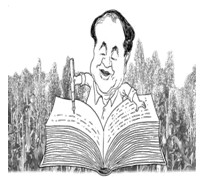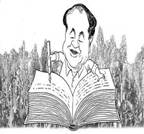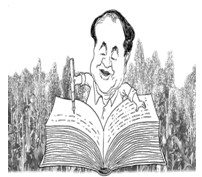网址:http://m.1010jiajiao.com/timu3_id_2394010[举报]
When he was 12, his parents died. He was alone and didn't get on well with others. People always laughed at him. No one showed kindness to him.
His only friend was a dog named Tiger. He gave his dog enough to eat and drink, but sometimes he was not polite to it. He didn't know that an unkind word sometimes could cut one's heart like a knife.
One day as he walked down the street, a young lady was walking in front of him. Suddenly one of her bags dropped from her arms. As she stopped to pick it up, she dropped other bags. He came to help her. “Thank you, dear! You are a nice little boy!” she said kindly, smiling.
A special feeling came to him. These were the first kind words he had ever heard. He watched her until she went far away, and then he whistled to his dog and went directly to the river nearby.
“Thank you, dear! You are a nice little boy” he repeated the woman's words. Then in a low voice he said to his dog, “You are a nice little dog!” Tiger raised its ears as if it understood.
“Unum! Even a dog likes it!” he said. “Well, Tiger, I won't say unkind words to you any more.” Tiger waved its tail happily.
The boy thought and thought. Finally he looked at himself in the river. He saw nothing but a dirty boy. He washed his face carefully. Again he looked. He saw a clean nice boy. He was amazed. From then on, he had a new life.
After telling this, the businessman stopped for a while, and then he said, “Ladies and gentlemen, this is the very place where that kind woman planted in me the first seed of kindness. All of us should learn about kindness. What a great power it has!"
小题1:The boy repeated the words “Thank you, dear! You are a nice little boy!” because .
| A.he was thinking about the words |
| B.he didn't understand the words |
| C.he wanted to talk to his dog |
| D.he liked talking to himself |
| A.The people laughing at him. |
| B.The kind words spoken to him. |
| C.The hard life. |
| D.His lovely dog. |
| A.funny | B.sad | C.lonely | D.excited |
| A.He never took good care of his friend, Tiger. |
| B.He usually had many friends around him. |
| C.He helped a young lady when her bag dropped. |
| D.He often washed his dirty face in lake. |
| A.A Dog and a Boy | B.A Poor Boy's Childhood |
| C.A Businessman and a Boy | D.The Power of Kindness |

Born into a farmer’s family, life was not easy when I was a kid. We were so poor that we often did not know where our next meal was coming from. I had to sell cabbages at the marketplace to support my family.
A storyteller once came to the marketplace, and I went to listen to him. My mother was unhappy with me for forgetting my job. But that night, while she was making clothes for us under the weak light of an oil lamp, I couldn't help retelling stories I'd heard that day. She listened impatiently at first, since in her eyes professional(职业的) storytellers were smooth-talking men—nothing good ever came out of their mouths. But slowly she was attracted by my retold stories, and from that day on, she never gave me any task on market days, unspoken agreement to enjoy new stories. As a repayment(回报)for Mother's kindness and a way to show off my memory, I'd retell the stories for her in lively detail. Soon, she wasn't the only member of my audience, which later included my elder sisters, my aunts, even my stubborn grandmother.
I knew she was worried about me. Talkative kids are not well thought of in our village, for they can bring trouble to themselves and to their families when they talk too much. Mother often reminded me not to talk so much, wanting me to be a silent and modest teenager. However, my natural desire(渴望)to talk never went away, and that is what makes my name – Mo Yan, which means ‘no speaking’. This strong wish to talk also improved my ability to express myself, which is important for writers who are also considered as storytellers.
【小题1】Mo Yan lived a/an ________ life when he was young.
| A.hard | B.colourful | C.easy | D.rich |
| A.little Mo Yan was interested in selling vegetables |
| B.his mother was attracted by the retold story at first |
| C.his mother didn’t let him listen to the new stories again |
| D.little Mo Yan had quite a good memory |
| A.Because she thought they never said anything good. |
| B.Because she thought they couldn’t make much money. |
| C.Because she thought they would affect Mo Yan’s schoolwork. |
| D.Because she thought most people didn’t like listening to stories. |
| A.silent | B.modest | C.talkative | D.trouble-making |
| A.My Unlucky Childhood | B.A Storyteller’s Childhood |
| C.My Kind Grandmother | D.More talking leads to success |

Born into a farmer’s family, life was not easy when I was a kid. We were so poor that we often did not know where our next meal was coming from. I had to sell cabbages at the marketplace to support my family.
A storyteller once came to the marketplace, and I went to listen to him. My mother was unhappy with me for forgetting my job. But that night, while she was making clothes for us under the weak light of an oil lamp, I couldn't help retelling stories I'd heard that day. She listened impatiently at first, since in her eyes professional(职业的) storytellers were smooth-talking men—nothing good ever came out of their mouths. But slowly she was attracted by my retold stories, and from that day on, she never gave me any task on market days, unspoken agreement to enjoy new stories. As a repayment(回报)for Mother's kindness and a way to show off my memory, I'd retell the stories for her in lively detail. Soon, she wasn't the only member of my audience, which later included my elder sisters, my aunts, even my stubborn grandmother.
I knew she was worried about me. Talkative kids are not well thought of in our village, for they can bring trouble to themselves and to their families when they talk too much. Mother often reminded me not to talk so much, wanting me to be a silent and modest teenager. However, my natural desire(渴望)to talk never went away, and that is what makes my name – Mo Yan, which means ‘no speaking’. This strong wish to talk also improved my ability to express myself, which is important for writers who are also considered as storytellers.
【小题1】Mo Yan lived a/an ________ life when he was young.
| A.hard | B.colourful | C.easy | D.rich |
| A.little Mo Yan was interested in selling vegetables |
| B.his mother was attracted by the retold story at first |
| C.his mother didn’t let him listen to the new stories again |
| D.little Mo Yan had quite a good memory |
| A.Because she thought they never said anything good. |
| B.Because she thought they couldn’t make much money. |
| C.Because she thought they would affect Mo Yan’s schoolwork. |
| D.Because she thought most people didn’t like listening to stories. |
| A.silent | B.modest | C.talkative | D.trouble-making |
| A.My Unlucky Childhood | B.A Storyteller’s Childhood |
| C.My Kind Grandmother | D.More talking leads to success |

Born into a farmer’s family, life was not easy when I was a kid. We were so poor that we often did not know where our next meal was coming from. I had to sell cabbages at the marketplace to support my family.
A storyteller once came to the marketplace, and I went to listen to him. My mother was unhappy with me for forgetting my job. But that night, while she was making clothes for us under the weak light of an oil lamp, I couldn't help retelling stories I'd heard that day. She listened impatiently at first, since in her eyes professional(职业的) storytellers were smooth-talking men—nothing good ever came out of their mouths. But slowly she was attracted by my retold stories, and from that day on, she never gave me any task on market days, unspoken agreement to enjoy new stories. As a repayment(回报)for Mother's kindness and a way to show off my memory, I'd retell the stories for her in lively detail. Soon, she wasn't the only member of my audience, which later included my elder sisters, my aunts, even my stubborn grandmother.
I knew she was worried about me. Talkative kids are not well thought of in our village, for they can bring trouble to themselves and to their families when they talk too much. Mother often reminded me not to talk so much, wanting me to be a silent and modest teenager. However, my natural desire(渴望)to talk never went away, and that is what makes my name – Mo Yan, which means ‘no speaking’. This strong wish to talk also improved my ability to express myself, which is important for writers who are also considered as storytellers.
小题1:Mo Yan lived a/an ________ life when he was young.
| A.hard | B.colourful | C.easy | D.rich |
| A.little Mo Yan was interested in selling vegetables |
| B.his mother was attracted by the retold story at first |
| C.his mother didn’t let him listen to the new stories again |
| D.little Mo Yan had quite a good memory |
| A.Because she thought they never said anything good. |
| B.Because she thought they couldn’t make much money. |
| C.Because she thought they would affect Mo Yan’s schoolwork. |
| D.Because she thought most people didn’t like listening to stories. |
| A.silent | B.modest | C.talkative | D.trouble-making |
| A.My Unlucky Childhood | B.A Storyteller’s Childhood |
| C.My Kind Grandmother | D.More talking leads to success |
When I was a child, my parents often took me to an old house in a thick forest. No other children ever stayed there. I didn’t even have the choice of playing with a brother or sister.
I could never understand what the attraction(吸引) of the house was, even for my parents, who enjoyed nothing better than to sit in silence with a good book. The woman in the house, my father’s distant cousin, was a terrible cook and her food was inedible.
One day, when I was wandering around the garden behind the house, I noticed a wooden house which had clearly been abandoned(被遗弃的). As I walked towards it, I heard a noise, like an animal moving hurriedly away. Then I saw a man with a long beard standing at the door. I was greatly surprised.
“Please don’t tell them you saw me,” he said. “They never use this place, and I have nowhere else to live.” “Don’t worry,” I said. “I won’t tell anyone. But are you all right out here? I mean—do you have enough to eat?” The old man shook his head.
The same evening, I took a small plastic bag into the dining room and, while no one was looking, emptied some of the food into it. Later, I got out of the back door secretly and gave the food to the old man, whose name I had discovered was Taff.
I had never seen anything else as lovely as the smile of satisfaction on Taff’s face when he ate the food. From then on, my visits to the old house had a purpose, and I enjoyed every minute of the rest of my stay.
【小题1】 How did the writer feel about staying in the old house at first?
| A.He was happy to be with his parents. |
| B.He enjoyed reading good books there. |
| C.He was pleased with the woods. |
| D.He felt very lonely. |
| A.too bad for him to eat | B.nice to look at |
| C.not enough to eat | D.as delicious as usual |
| A.near the back door of | B.in the dining room of |
| C.in the garden behind | D.among the bushes before |
| A.He was poor and hungry. |
| B.He helped to repair the old house. |
| C.He liked to play hide-and-seek with the writer. |
| D.He raised many animals. |
| A.it’s nice to raise wild animals |
| B.it’s valuable to help others |
| C.it’s good to live in the forest |
| D.it’s comfortable to live in the old house |